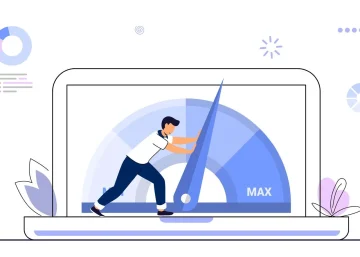Take a look at the SEO vs. PPC comparison for 2019. We won’t stop on analyzing SEO vs. paid search. We’ll dig deeper and view them as two completely different strategies for your business development.
Intro
If you want to revamp SEO and PPC practices, outrank competitors, drive more traffic and ensure a constant leads flow to your website, you can’t miss this article. We’re going to focus on the SEO vs. PPC comparison for 2019 to determine which approach will best fit your marketing plan.
As the SEO vs. PPC statistics show, 42% of all searchers select the top-ranked result, and only 23% of them click on a PPC link. More than that, The ROI of SEO vs. PPC reveals: 40% of SEO campaigns reach returns in access of 500%, while for PPC campaigns the rate is 22%. But which one is better in the long run?
What’s SEO?
Search engine optimization or SEO is a practice that grows traffic coming to your website and delivers more targeted visitors through organic search results. You don’t have to pay for ads here. The search engine itself sets your website or content relevance for visitors and ranks it accordingly.
The optimization process cannot go without two main components:
1. Onsite or on-page SEO defines what you rank for. All activities are conducted to help search engine bots crawl and master the website content and structure. You can implement:
- Keyword research.
- Internal linking.
- Page titles and descriptions (metadata).
- Technical auditing.
- Usability control and much more.
2. Offsite or off-page SEO determines how high you rank. Marketers work to enhance the domain authority and acquire quality external links focusing on:
- External link building strategy.
- Social media marketing.
- Content marketing, etc.
Onsite and offsite SEO run together to boost the website ranking. But what pros and cons of SEO should you consider?
SEO Pros
- Cost-effectiveness. Organic traffic is not cheap or easy. But it’s cost-effective if you want to attain more target leads and hike brand awareness. It requires some initial investment to develop the website visibility but you don’t have to pay anything for each impression or click.
The PPC statistics demonstrates, that the average cost per click (CPC) across all industries is $2.32 and the average cost per action (CPA) is $59.18. Using SEO you get so desired spot is search results actually free of charge. - Greater efficiency in niches with low competition. Using SEO for business promotion you can benefit from search terms that are more niche and less competitive, getting prime stands in search results. Profile your niche, define low-competition keywords, prepare content, link it with existing material and watch how your website moves to the peak of search results. SEO vs. paid search? The favorite is obvious.
- Works for restricted content. You cannot use PPC advertising to promote content search engines consider legally or culturally sensitive: healthcare and medicines, alcohol, gambling, adult content, etc. If your business operates in one of the linked spheres, you can totally forget about paid ads. Only search engine optimization will help to reach the top spot in search results.

SEO Cons
- Neither fast and cheap nor easy. The optimization budget can vary, count on the business niche. The higher competition the more time and money you must invest.
Another question is how long are you ready to wait to get high ranking? The competitiveness of the keywords involved directly impacts the promotion speed. In one instance, it may take months, in other – years to reach the desired position. PPC will start bringing you leads almost immediately. This time, paid search win in the SEO vs. PPC battle. - No 100% “optimization”. SEO is an evolving process. It cannot be done once and forever. To keep ranking, you need to run regular audits and competitors’ analysis. The more time and efforts you dedicate, the more optimized the website will be.
Remember recent GDPR (General Data Protection Regulation) update and its huge impact on all business aspects, including SEO? The GDPR compliance is expected to become a ranking factor. Is your website ready for such an update? - Not easy to master. To become a SEO expert, you have to grasp more than just keyword research and link building. Content and technical SEO are also involved in getting high rankings. You may need to hire external contractors, buy SEO tools.
Still, these activities can’t shield you from unexpected Google search algorithm updates able seriously damage your positioning and wipe away all optimization achievements up to removing from index.
What’s PPC?
Using PPC or Pay-Per-Click Advertising you pay to get visitors for your website. The mechanism looks like the following: you appoint the keywords you want to be found by, prepare ads and define the advertising budget. Potential customers see your business ads when browsing a specific topic. They click on it – you pay for each click.
This method grants an array of advertising options, when comparing organic vs. paid traffic, multiplying your chances to reach more prospects through different channels. Only you decide which variant is a perfect match.
- Search advertising. Ads are displayed across the most trendy search engines: Google, Bing, Yahoo, etc.
- Display advertising. Text, banner or image ads are shown on niche sites that belong to Google Display Network.
- Remarketing advertising is a part of search, display, and social media ad campaigns. Using cookie technology, it retargets users showing them ads relevant to their previous online searches.
- Shopping advertising. A Google Shopping campaign allows showcasing items you’re selling in a carousel above search results, boosting traffic and bringing qualified leads to your store.
- Mobile advertising got a significant rise during the recent years. It includes pop-up advertisements, mobile banners, and in-app ads.
- Social media advertising refers to ads that appear in target’s newsfeed or social handouts. Leading social media, like Facebook, Tweeter or LinkedIn, can become your ever-living source of paid traffic.
Following PPC stats, it’s obvious that Google’s net advertising revenues worldwide does not stop to evolve, from 63.11 billion U.S. dollars in 2016 and up to predicted 82.58 billion U.S. dollars in 2018. Despite such promising figures, pay per click has its own advantages and disadvantages.
PPC vs. SEO Advantages
- It’s visually appealing. You decide what information to highlight in your ad and what words to use to reach the customer. Apart from the marketing message with a strong call-to-action, paid ads can contain locations, site links, product images, and pricing.
- It does not involve an extensive marking team. The course of building up a PPC campaign is quite easy and straightforward. You don’t have to bother about SEO-friendly content, monitor constant search engine’s algorithm updates and analyze the ways it may impact your position. Great if you can initiate a PPC campaign yourself. Or hire an expert to save you time.
- It does not imply an on-going work. You set up the whole process up and running, bid on the desired spots in search results, and only monitor the results, enjoying increased traffic coming to your website, clicks, and conversions.
- It’s perfect for a local search. PPC works only if seen by the right audience. When you don’t have an unlimited budget to compete, let’s say, with a national retailer or when running a region-specific business, you can try your luck on the local search. It’s enough to customize your campaign to specific audiences and searching segments to sustain real results.
- It has improved analytics. You can use different metrics Google AdWords grants to measure efforts, evaluate the keywords performance, what ads do convert and bring ROI, even track their effectiveness in real time, as well as scale up and adjust your advertising budget.
Besides, with the last GoogleAds interface update it became far easier to set up, navigate and control PPC campaigns driving more performance.
Now you can automate key optimizations, access a variety of insights, run an in-depth analysis and concentrate on the account strategy.
PPC pros and cons are closely affiliated with SEO. What negative aspects should we consider?
PPC Cons
- PPC is expensive. And it’s not a secret. The more you pay, the better results you can expect but only as long as you put money into it. This is why many business owners prefer SEO. Yes, it requires more time to implement but grants a long-lasting effect in prospect. Remember, when you turn off your marketing campaign leads from paid search will stop coming.
- Prohibited and restricted content. There is a list of businesses that cannot be promoted on Google AdWords. No matter how much you are willing to pay. If the topic does not follow Google Ads policy, you won’t make it through.
- Intense competition. Competitors follow close behind trying to build a smarter promotion strategy, use better keywords, and outbid you. Everyone waits for solid results and wants to get them fast. Some market players are ready to pay a really high price.
Sometimes, the race becomes so fierce that it makes sense to put PPC on hold and scrutinize how you can spend less and benefit from SEO.
SEO vs. PPC Comparison
|
SEO |
PPC |
|
Overall effort |
|
| Requires involvement of qualified specialists. | Easy to set up and monitor. |
|
Control |
|
| Search engine controls ranking factors and “decides” how much and what traffic you receive. | You control and adjust the advertising budget that directly impacts the quality of traffic you get. |
|
Guarantee |
|
| No guarantee for an immediate 1st- page ranking, but you get more qualified leads. | The more you pay the higher your ad goes. But leads needed to be nurtured to convert. |
|
Budget |
|
| Implies indirect cost. You pay for SEO services. | You pay for each click on your ad, bid on top spots. |
|
Timeline |
|
| Requires time to set up, but has a continuous effect. | You start getting traffic right after the ad publishing. |
|
CTR & ROI |
|
| Organic search results earn more trust. The better your position, the higher your CTR and ROI. | Well-optimized ads bring hot leads and result in even better CTR and ROI, compared to SEO. But the initial advertising budget will be higher. |
|
Relevance |
|
| Ideal for a continuous organic traffic flow, especially when you are ready to wait for results. | Perfect for getting quick results and sizable traffic flow. |
|
Risks |
|
| Changes in a given search engine’s algorithm impact your ranking and black hat tactics lead to penalties. | Traffic vanishes when your campaign ends. Bidding on top spots costs a lot and competitors can use “Click Fraud” to pull out your advertising budget. |
|
Stability |
|
| Relatively stable if you run a thorough website optimization. | You ad positioning can change, depending on competitors’ bidding tactics. |
|
A/B Testing |
|
| Hard to A/B test as search engines dislike duplicate content. | Easy to A/B test by running two ads. |
|
Brand Awareness |
|
| Increases brand awareness through useful content and helps to build trust. | Not as good for brand awareness as its basic goal is to sell, but can easily boost brand visibility. |
|
Positioning |
|
| Goes after the paid search results. Highly optimized websites get first page positions. | Appear on top or below the organic results. Higher positions = higher cost per click. |
SEO vs. PPC in 2019: which one to choose?
Both methods have their own drawbacks and merits being two distinct customer acquisition channels. Which one is better to use? It banks on your business niche. If you aim to make a rapid market entry, drive quick results and have a budget to spend, try PPC. But if your budget is tied up, you’d better invest in SEO.
When the PPC advertising price is much too high for the target niche, but getting speedy returns becomes literally a life and death matter, you can test various tactics and scenarios while building and running an ad campaign. Note that in this case, your efforts will be equal to SEO.
Obviously, it’s better to include both SEO and PPC in your marketing plan this year. Reason? Such an approach grants swift traffic flow and secures a strong long-term online presence for your brand. But again, it counts on the goals you set and recourses you have.
Final Tip
Prior to opting for paid or organic traffic, take time and analyze your competitors and chances to outplay them. Study your business niche and target audience as well as budget, approximate expenses and expected ROMI for at least six on-coming months.
How to act when you have strong niche competitors who don’t use PPC advertising? First, admit that you can’t overtop them by high-frequency queries using only one marketing channel. Second, conduct SEO for middle-frequency and low-frequency search queries, while running PPC ad campaigns for high-frequency queries.
If you make up your mind to move with PPC in 2019, experiment on small budgets. All efforts will pay off and equip you with a priceless experience.







